News
New species of deep-sea corals discovered in Atlantic Marine Monument
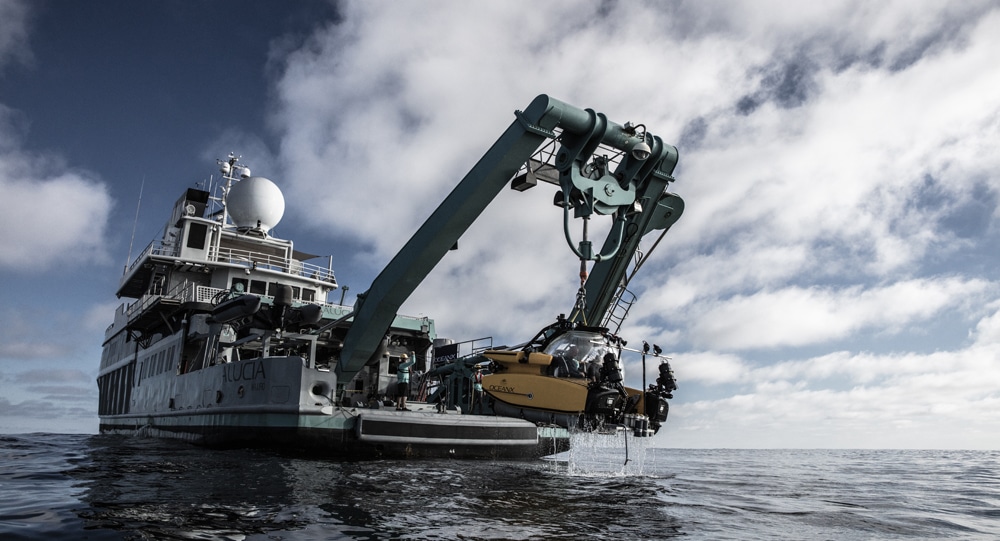
DNA analysis recently confirmed that Woods Hole Oceanographic Institution (WHOI) scientists and their collaborators at OceanX, the University of Connecticut (UConn), and NASA’s Jet Propulsion Laboratory (JPL) discovered two new species of deep-sea corals during a September 2018 expedition in the Northeast Canyons and Seamounts National Monument, located about 100 miles from the Northeast U.S. coast.
The research team was led by deep-sea biologist Tim Shank of WHOI and included co-PIs Taylor Heyl (WHOI), Rachel O’Neill (UConn), and John Leichty (JPL). Utilizing OceanX’s research and exploration vessel Alucia, the team explored and surveyed several of the unique deep-sea habitats in the monument, which includes three underwater canyons deeper than the Grand Canyon.
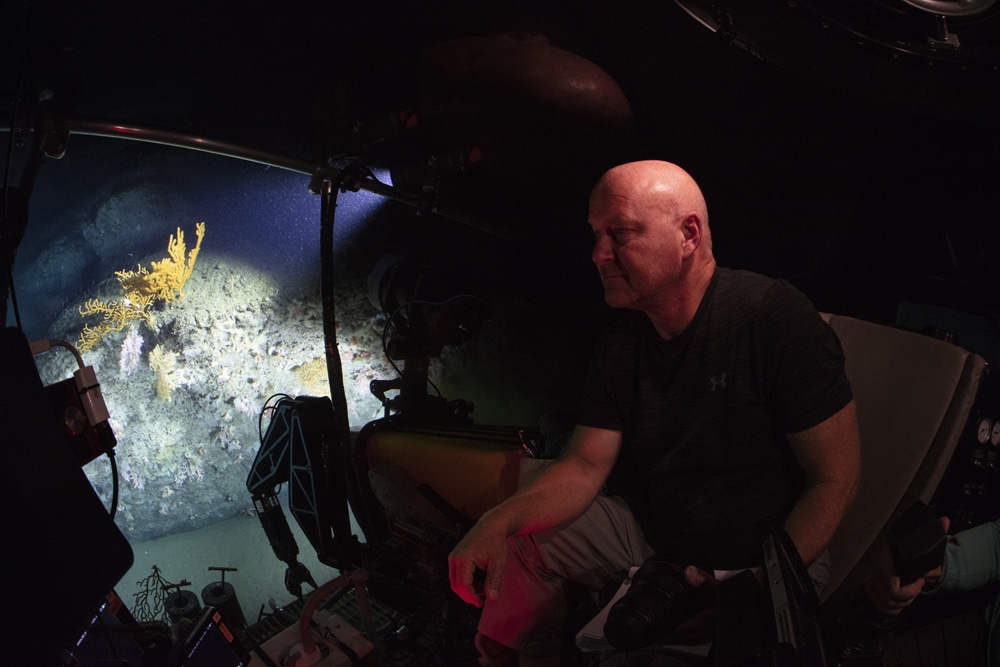
WHOI deep-sea biologist Tim Shank in the OceanX submersible Nadir diving in Lydonia Canyon. (Photo by Luis Lamar, National Geographic)
During the two-week expedition, the scientists collected a total of 29 coral samples in Lydonia Canyon at depths between 369 meters (1,211 feet) and 903 meters (2,963 feet) using the submarine Nadir. These were the first human-occupied submersible dives in this canyon since 1982 and only the third deep-submergence mission to Lydonia Canyon.
“Through ongoing genetic barcoding, we have identified at least two corals so far that represent genetically different species,” Shank said. “They don’t show sufficient genetic similarity to be any species that is currently known in the world’s repository for DNA sequences.”
According to Heyl, the two likely new species found in Lydonia Canyon are bubblegum corals, which she described as soft, deep-water corals, “with bundles of polyps that resemble wads of bubblegum along their branches.”
“We didn’t expect to find bubblegum corals there at all, since they haven’t been found in any of the neighboring canyons,” Shank said. “We found pink, red, and white bubblegum corals thriving there.”
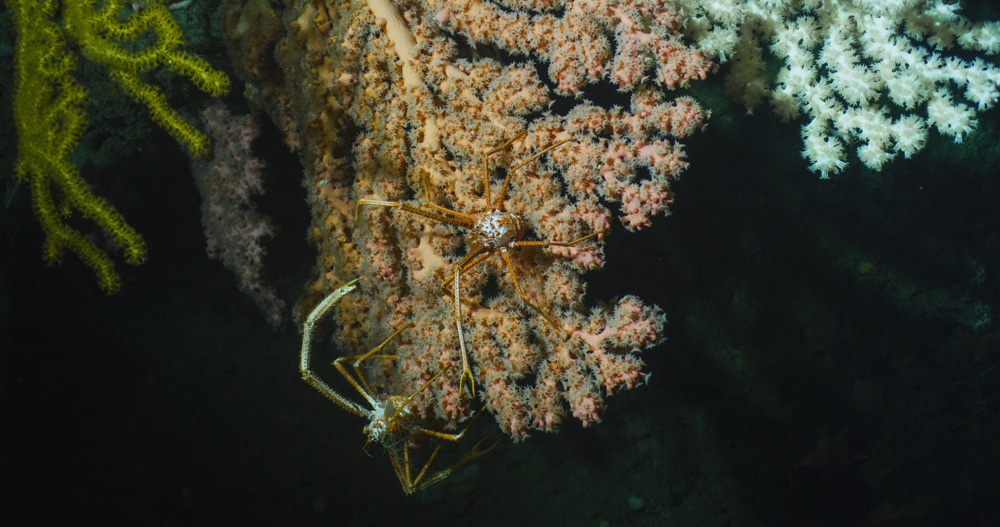
A bubblegum coral (Paragorgia spp.) similar to, but distinct from, the new species identified in Lydonia Canyon. (Photo by Ivan Agerton, OceanX.)
“We observed a high diversity of other corals—at least 24 species—on the seafloor and are discovering more through genetic analyses,” he added.
Shank noted that coral species deep in the canyon at more than 900 meters (2,953 feet) below the surface were very different from those found in shallower waters. In total, the team collected some 200 samples of corals, sponges, and other marine life during the expedition’s three submersible dives.
“We’re still analyzing the data,” he noted. “But we found surprising patterns of species diversity at different depths and among the different canyons in the monument.”
Corals found at these depths grow at an extremely slow pace: One that is a foot tall could be as much as 500 years old. Deep-water corals around the world also provide the framework to support entire ecosystems that contain more than 2,500 species living on and around them, including brittle stars, squat lobster crabs, and sea lily crinoids.
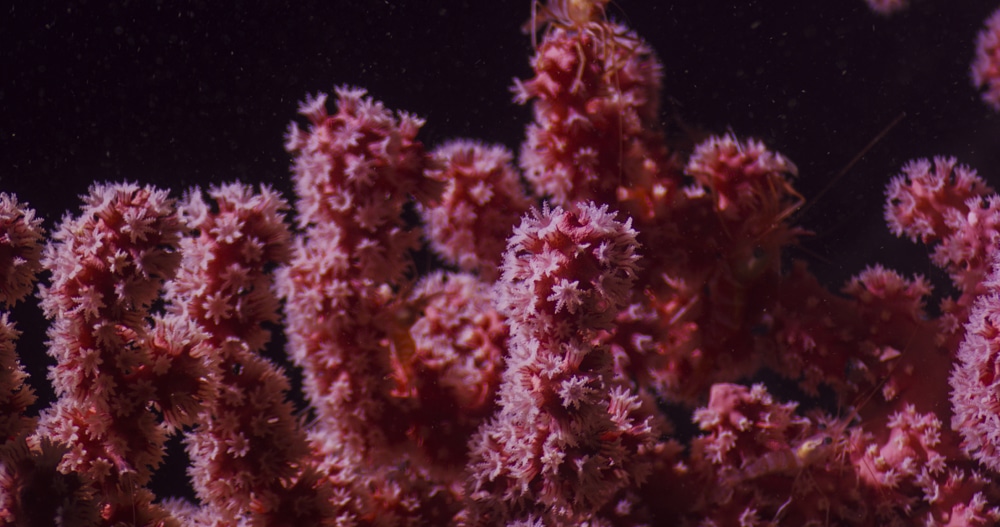
A bubblegum coral (Paragorgia spp.) similar to, but distinct from, the new species identified in Lydonia Canyon. (Photo by Ivan Agerton, OceanX.)
In addition, the team tested a new universal barcode for invertebrates during the expedition. Barcoding is a technique that uses a specific segment of an organism’s DNA to identify different species at the genetic level, rather than by analyzing an organisms physical characteristics. UConn’s O’Neill and her team were able to validate the effectiveness of the new barcode by distinguishing all of the different salp species present in a single, commingled sample. Salps are a gelatinous, free-swimming animal common to the open ocean that may play an important role in Earth’s climate system by consuming carbon near the surface and excreting it in pellets that sink into the deep ocean.
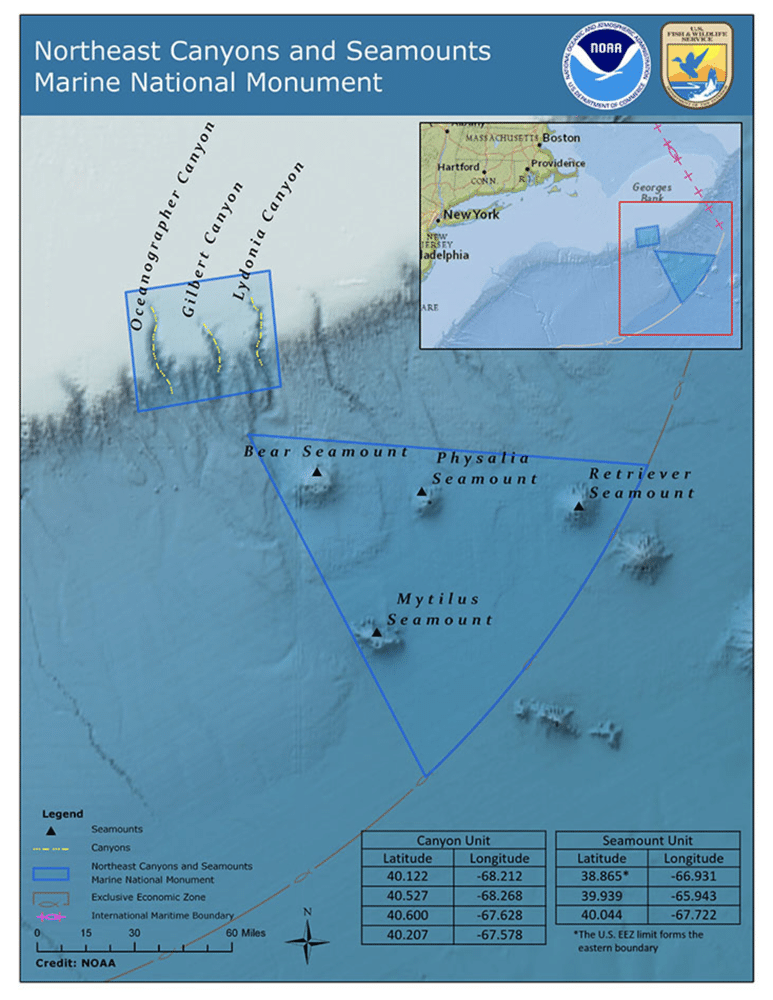
The Northeast Canyons and Seamounts National Monument covers approximately 4,913 square miles (12,724 square kilometers), is located about 130 miles east-southeast of Cape Cod, and includes two distinct areas: one that covers three canyons and one that covers four seamounts. (Map courtesy of NOAA)
The monument was created by President Barack Obama in 2016 and is the first and only national marine monument in the Atlantic Ocean. However, it is currently under threat of losing its protected status.
“The Northeast Canyons represent some of the most unique and biodiverse habitats in the Atlantic Ocean, and exploring and understanding these canyons is critical to creating awareness for and protecting them,” said Vincent Pieribone, Vice Chairman, OceanX. “We are thrilled to learn with our partners at WHOI, JPL, UConn and Bloomberg Philanthropies that this mission uncovered new species of coral. These discoveries will help move us toward a better understanding of our oceans, our planet’s most important and most under-examined natural resource.”
The expedition was made possible through the Bloomberg-OceanX partnership and pledge of a combined $185 million over the next four years to facilitate ocean exploration and conservation around the world. Through the partnership, Bloomberg Philanthropies and OceanX aim to create a critical platform to increase the world’s collective understanding of and engagement in our oceans.
Find out more at www.whoi.edu.
Gear News
Introducing the TR-80, IR-50 and CS-30 Regulators from DYNAMICNORD

Whether you are a beginner or a professional diver – with the three new main regulators from DYNAMICNORD, everyone will find their favourite regulator. They all look super stylish.
Excellent performance with the TR-80
Quality and performance are the be-all and end-all for regulators. It is not for nothing that the TR stands for Tec Reg. The innovative design of the TR-80 guarantees absolute reliability – even in ice-cold waters.

Perfect breathing effort at 0.8 J/l / certified for diving in waters below 10 degrees / structural design made of solid brass for best cold protection / membrane-compensated design with dry seal of the first stage / reduced exhalation effort thanks to optimized exhalation membrane and bubble deflector / adjustable Venturi (dive/predive) and adjustment knob for individual inhalation comfort / innovative design of the front cover prevents free-flow in strong currents or when diving with scooters / design made of sandblasted brass, matt chrome finish / 2 HP and 4 LP outlets / mouthpiece made of high-quality, anti-allergic silicone for maximum comfort.


Amazing underwater adventures with the IR-50
The IR-50 is the top regulator for advanced and experienced divers. Natural breathing is the essence of this regulator.

Ideal breathing effort at 0.8 J/l /certified for diving in waters below 10 degrees / compensated membrane / adjustable venturi (dive/predive) and adjustment knob for individual inhalation comfort/ outlet valve and deflector for minimum exhalation effort and reduction of bubbles on the face / design made of sandblasted brass, matt chrome finish / 2 HP and 4 NP outlets / mouthpiece made of high-quality, anti-allergic silicone for maximum comfort.


The Workhorse – our CS-30
For diving centres and diving beginners – the workhorse stands for strong construction, reliability and robustness. Perfect for your training.

Optimal breathing effort at 0.8 J/l /recommended for diving in waters above 10 degrees / non-compensated piston / adjustable venturi (dive/predive) / outlet valve and deflector for minimum exhalation effort and reduction of bubbles on the face / design made of sandblasted brass, matt chrome finish / 1 HP and 3 NP outlets / mouthpiece made of high-quality, anti-allergic silicone for maximum comfort.


Octopus OP-30
The OP-30 is the ideal addition to all DYNAMICNORD regulators. It is identical in construction to the CS-30.

The TR-80, IR-50, CS-30 (DIN & INT) regulators and the Octopus OP-30 are available from DYNAMICNORD dealers and in the online store.
DYNAMICNORD – Your Outdoor Companion.
Marine Life & Conservation
Paul Watson Released as Denmark Blocks Japan’s Extradition Bid

Renowned anti-whaling activist Paul Watson has been released from custody in Greenland after spending five months in detention. Denmark’s Justice Ministry rejected Japan’s request for his extradition, citing insufficient guarantees that his time already served in custody would be credited against any potential sentence.
The 74-year-old Canadian-American was arrested on July 21 in Nuuk, Greenland’s capital, when his ship docked to refuel. His arrest was based on a 2012 Japanese warrant related to a 2010 encounter in Antarctic waters. Japan alleged Watson obstructed operations and caused damage to a whaling research ship during efforts to disrupt illegal whaling. Watson has consistently denied these claims, maintaining his commitment to marine conservation.
Denmark, which oversees extradition matters for Greenland, concluded that while the legal conditions for extradition were met, the lack of assurances from Japan regarding time-served credit made extradition untenable.
In a video shared by his foundation, Watson expressed gratitude and relief, saying, “After five months, it’s good to be out… and good to know they’re not sending me to Japan.” He added that the most difficult part of his time in custody was being separated from his two young sons.
Watson is a pioneering figure in marine conservation, known for founding the Captain Paul Watson Foundation in 2022 after decades of activism with the Sea Shepherd Conservation Society. His bold efforts to defend marine life have earned him widespread support, including from celebrities and conservationists. His work has also been featured in the acclaimed reality TV series Whale Wars.
Watson’s lawyer, Jonas Christoffersen, praised the decision, stating, “We are happy and relieved that Paul Watson is now free.” He added that Watson is eager to reunite with his family and continue his vital work.
The arrest occurred while Watson’s vessel, the M/Y John Paul DeJoria, was en route to the North Pacific with a team of 26 volunteers to intercept a Japanese whaling ship. His foundation described the arrest as politically motivated and emphasized that Watson’s actions were focused on ending illegal whaling practices.
Japan resumed commercial whaling in 2019 after leaving the International Whaling Commission, asserting that whale meat is a cultural tradition. Conservationists, however, continue to challenge these practices, highlighting their impact on marine ecosystems.
Despite the challenges, Watson remains steadfast in his mission to protect marine life and bring attention to whaling practices. His dedication to ocean conservation has made him a globally respected advocate for the environment.
-

 News2 months ago
News2 months agoIconic SS United States to become the World’s Largest Artificial Reef
-

 News3 months ago
News3 months agoBook Review – 52 Assignments: Underwater Photography
-

 Gear News3 months ago
Gear News3 months agoDYNAMICNORD – New German diving brand enters the British market
-

 News3 months ago
News3 months agoExploring Cenote El Pit: A Diver’s Dream
-

 Gear News3 months ago
Gear News3 months agoTry BARE drysuits (and maybe even win one!) this Friday with Sea & Sea at North West Dive Fest
-

 Marine Life & Conservation3 months ago
Marine Life & Conservation3 months agoBook Review: Coral Triangle Cameos
-

 Blogs2 months ago
Blogs2 months agoDive the Egyptian Red Sea this Autumn with Regaldive
-

 News3 months ago
News3 months ago2024 Ocean Art Underwater Photo Competition Announced













